Konan, Shiga
| Konan, Shiga (湖南市; Konan-shi) | ||
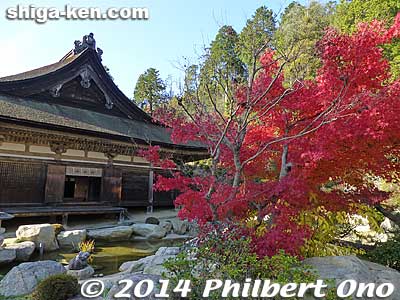 Zensuiji, National Treasure More Konan photos here. Zensuiji, National Treasure More Konan photos here.
| ||

| ||
| Location | Shiga Prefecture, Kinki region, Honshu island, JAPAN | |
| Population | 54,627 (?? foreigners) (2022-11-01) | |
| Area | {{{TotalArea}}} km² | |
| City Centers | Kosei (Kousei), Ishibe | |
| Major Sights | Jorakuji, Chojuji, and Zensuiji Temples | |
| Major Gateways | JR Kusatsu Line Ishibe Station, Kosei Station | |
| Train Stations | JR Kusatsu Line Ishibe Station, Kosei Station, Mikumo Station | |
| Claim to Fame | Konan Sanzan are three temples with National Treasures. | |
| Products | ||
| Neighbors | Yasu, Ritto, Koka, Ryuo-cho | |
| Old Name(s) | Ishibe-cho, Kosei-cho | |
| Keywords | Konan Sanzan, shukuba | |
| Historical Persons | ||
| Links | Konan Articles | Konan Photos | |
| Konan Tourist Information | ||
| Location | 〒520-3288 滋賀県湖南市中央1-1 湖南市商工観光課内
Chuo 1-1, Konan-shi, Shiga 520-3288 JAPAN | |
| Phone | 0748-71-2331 | |
| Tourist Links | Tourist Ass. | |
| Int'l Association | Konan International Association | |
| Volunteer Guides | Website | |
| Konan City Hall 湖南市役所 | ||
| Address | 東庁舎 〒520-3288 滋賀県湖南市中央一丁目1番地
Chuo 1-1, Konan-shi, Shiga 520-3288 JAPAN | |
| Phone/Fax | East Office 0748-72-1290
West Office 0748-77-3101 | |
| Official Site | Japanese | English | |
| Symbols | Flower: | Rhododendron |
| Tree: | ウツクシマツ | |
| Bird: | Japanese Bush Warbler | |
| Others: | Utsukushi matsu pine tree | |
| Logo: | Blue water for Lake Biwa and green spot for Konan in the south | |
| Sister Cities | ||
by Philbert Ono, updated: Dec. 24, 2022
Small City with Three National Treasures
Konan (湖南市; Konan-shi) is a landlocked city in southeastern Shiga Prefecture, Japan.
Famous for:
- Konan Sanzan temple trio of Tendai Buddhist temples with National Treasure buildings and autumn foliage.
- Ishibe-juku, 51st post town on the old Tokaido Road.
One of Shiga's smaller cities and landlocked, Konan was formed in 2004 upon the merger of Kosei and Ishibe towns. Ishibe-juku was the 51st post town on the Tokaido Road and there is an outdoor architectural museum replicating typical buildings from the old post town.
The city also has three Tendai Buddhist temples noted for National Treasure buildings. They are collectively called "Konan Sanzan" (湖南三山) (Konan Temple Trio). For such a small city to have as many as three National Treasures is really something to boast about. (There are Japanese prefectures that don't have any National Treasures.) Konan also has traditional crafts such as indigo dyeing and pottery called Shimoda-yaki.
"Konan" 湖南 means "South of the Lake" which might be misleading in Japanese since the city does not face the Lake Biwa and has no lake shore. (The lake's southern shore is dominated by Otsu.) The name is also sometimes confused with Konan-cho 甲南町, a former town in neighboring Koka city which also has Konan Station 甲南駅. Note that Konan is not pronounced like "Conan" (as in the barbarian). Konan is easily accessble via the JR Kusatsu Line from JR Kusatsu Station.
Sights

| 
| 
|
| Jorakuji Temple | Chojuji Temple | Ishibe Shukuba no Sato |
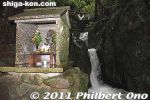
| 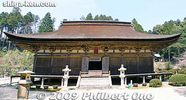
| 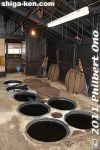
|
| Fudo-no-taki Waterfall | Zensuiji Temple | Indigo Dyeing |
- Chojuji Temple 長寿寺 - Meaning "Long Life Temple," Chojuji's Hondo temple hall is a National Treasure. It belongs to the Tendai Buddhist Sect and one of the Konan Sanzan Temple Trio along with Jorakuji and Zensuiji Temples. It worships Koyasu Jizo, the guardian deity for easy childbirth (子安地蔵). Pray here for pregnancy, safe childbirth, and long life. Fall colors are also nice. Entry to the main Hondo Hall is normally closed except during mid- to late November during the autumn foliage. However, if you call and make an appointment (Phone: 0748-77-3813), they may open it for you (9 am-4 pm). Admission may be charged to enter the main hall. You can still view the buildings from outside without entering the hall. Behind the main hall is a building housing a golden Buddha statue three meters high. During the Occupation, an American soldier apparently tried to steal it. Fortunately, he failed. 5-min. bus ride from Ishibe Station. Take the Ishibe Junkan-sen Route Meguru-kun bus (石部循環線) and get off at Chojuji. Buses leave about once an hour. The bus will pass Jorakuji, but it is better to see Chojuji before Jorakuji. After visiting Chojuji, you can walk downhill to Jorakuji. Bus schedule on weekdays and weekends (in Japanese). Phone: Map
- Jorakuji Temple 常楽寺 - A stone's throw from Chojuji Temple in Konan, Jorakuji Temple (est. 708) of the Tendai Buddhist Sect boasts two National Treasures with its main hall and three-story pagoda. It worships the Thousand Armed Kannon or Senju Kannon (千手観音菩薩). Pray here for anything and everything. Entry to the main Hondo Hall is normally closed except during mid- to late November during the autumn foliage. However, if you call and make an appointment (Phone: 0748-77-3089), they may open it for you (9 am-4 pm). Admission may be charged. You can still view the buildings from outside without entering the hall. There's a short trail lined with 33 small Kannon statues. 13-min. by bus from JR Ishibe Station or walk 15 min. from Chojuji. Best to visit Chojuji before Jorakuji. Otherwise, you will have to walk uphill from Jorakuji to Chojuji. Buses leave about once an hour. Bus schedule on weekdays and weekends (in Japanese). Be sure to check the return bus schedule at the bus stop before going to the temple. Official site | Map
- Zensuiji Temple 善水時 - One of the Konan Sanzan Trio of Tendai Buddhist National Treasure temples in Konan, Zensuiji is accessible by bus from JR Kosei Station on the JR Kusatsu Line. Established in the 8th century, the temple's main Hondo Hall is a National Treasure. The present Hondo was built in 1366. It was named "Good (Efficacious) Water Temple" after the temple's pond water apparently cured Emperor Kanmu's illness in the 9th century. It worships Yakushi Nyorai, the Buddha of medicine and healing (薬師如来) which is hidden from view. The main object of worship is hidden behind closed doors at all three Konan Sanzan temples. Pray here for good health or to cure your illness. The Hondo main hall houses 30 Buddhist statues, 15 of them are Important Cultural Properties dated to be centuries or a thousand years old. You can enter Hondo main hall year-round without an appointment (hours: 9 am-4 pm, or till 5 pm March-Oct.). Small admission charged. Temple is on the slope of Mt. Iwane. There are no direct buses running between Zensuiji and the other two Konan Sanzan temples (Chojuji and Jorakuji). So you have to hop on the train to Kosei Station and take a bus from there. At Kosei Station's North Exit (Kitaguchi), take the Meguru-kun bus that stops at Iwane (岩根). Buses leave once an hour, taking about 12 min. Bus schedule here. From the Iwane bus stop, there is a pleasant hillside trail going up to Zensuiji, taking about 15 min. If you're traveling with a friend or small group, you can take a taxi. Official Website | Map
If you are visiting the Konan Sanzan temples during mid- to late November for the autumn leaves, they have pamphlet and bus schedule here (in Japanese). All three temples are in quiet, rural areas.
- Ishibe-juku and Ishibe Shukuba no Sato 石部宿場の里 - Ishibe-juku was the 51st post town or lodging town on the Tokaido Road where even Emperor Meiji once stayed (with an entourage of over 3,000) on his way to Tokyo. Other lodging guests include Kondo Isamu (Shinsengumi), Shogun Tokugawa Iemochi, and Tokugawa/Hitotsubashi Yoshinobu before he became shogun. Ishibe-juku was 1.6 km long, lined with 32 hatago inns for ordinary travelers and two Honjin VIP lodges. You can walk through the original Ishibe-juku area and see a few signs indicating where the Honjin was. One building you should see is the reconstructed Dengaku Chaya Tea House (田楽茶屋) that appears in Hiroshige's woodblock print. It's a rest place for tourists. When it's open, they make and serve a sweet snack made of potato. There are no original buildings, but the Ishibe Shukuba no Sato outdoor architectural park in Ameyama Cultural Sports Park has several reconstructed buildings of the old Ishibe-juku post town. They include a hatago inn, tea house, rice storehouse, and farmer's home. The buildings are filled with old artifacts donated by locals. There is also the Tokaido Ishibe-juku Museum (東海度石部宿歴史民俗資料館) next to the park. The museum shows a scale model of the Kojima Honjin, giving you a good idea of its exclusivity. Ishibe Shukuba no Sato is about 1 km from Ishibe Station. Open 9 am–4:30 pm, closed Mon., the day after a national holiday, and Dec. 28–Jan. 4. Small admission charged. Map
- Konki Senshoku indigo dyeing - Konki Senshoku is a rare shop in Shiga still producing indigo dye and dye fabrics traditionally for 200 years. The technique came from Kyoto. They grow their own indigo plants in Konan, dry the leaves in the sun, and extract the dye. Sady, the current and aging master, Tsuneo Uenishi, has no successor. You can do indigo tie-dyeing with a cotton handkerchief (1200 yen), T-shirt, etc. Open: 9 am-4 pm. Take a taxi from Ishibe Station, Kosei Station, or Mikumo Station (closest station) on the Kusatsu Line. Limited parking available. Call to make reservations for tie-dyeing: 0748-75-0128. Address: Shimoda 1530-1, Konan-shi, Shiga 湖南市下田1530-1 Map
- Konan Traditional Crafts Hall (Dento Kogei Kaikan) 湖南市伝統工芸会館 - Omi Shimoda-yaki pottery (近江下田焼) is white with dark-blue indigo colors. All pieces are handmade by one potter, Kazu Kosako (and his wife Chiharu). He is the last of his kind since there is no successor. Shimoda-yaki has a plain and simple design, made for practical, everyday use. They are ergonomic to fit well in your hands or to your lips. Shimoda-yaki originated around 1750 with white clay found in Konan's Shimoda area. Shimoda potter aspirants took the clay to Kyoto to learn the craft, then returned to Shimoda and started making Shimoda-yaki pottery. Most of the Shimoda-yaki potters (as many as 14 of them) eventually went out of business and became extinct in 1989 when the last of them passed away. However, Kazu Kosako, who apprenticed under the last Shimoda-yaki potter, succeeded his master in 1995. For a small fee, you can paint your own Shimoda-yaki dish with a brush and a dye called absolite. Or you can try making Shimoda pottery (starting at 3500 yen). Your fired piece will be shipped to you after a few weeks. Open: 10 am-6 pm, closed Mon.-Tue. 5 min. by bus from JR Mikumo Station on the Kusatsu Line. Phone: 0748-72-7444 Address: 湖南市岩根1656 Web page Map
- Fudo-no-taki Waterfall 不動の滝 - Cool and convenient waterfall just next to the road in a lush setting. Take a taxi from JR Mikumo Station and go south. Map
- Nigori-ike Koen Park - Local park with a pond noted for cherry blossoms. Nice for picnics. Map
- Yurara Onsen Hot Spring 十二坊温泉ゆらら - Large natural hot spring facility on the slope of Mt. Iwane near Zensuiji temple. They have a large hot spring pool, outdoor baths, and gym. A short walk from Yurara is a giant stone relief of Fudo-myo-o called Madai Fudo-myo-o (磨崖不動明王) 4.3 meters high. Yurara open: 10 am-10 pm, admission ¥600 for adults, ¥300 for kids. Phone: 0748-72-8211, Address: Iwane 678-28, Konan, Shiga 滋賀県湖南市岩根678-28
- Kocopia (ここピア) - Large local gift and produce shop for locally grown vegetables, food, crafts, and souvenirs. Opened in autumn 2016. (The old Konan Marche has closed.) Like a michi-no-eki (if you know what that is). Local goods include Yahei hot chili pepper spices, Shimoda-yaki pottery, and confections. Ample parking next to Aeon Town Konan. Local buses run from JR Kosei Line (North Exit). Open: 9 am–7 pm, closed Tue. Phone: 0748-72-5275. Address: Iwane 4528-1, Konan, Shiga 滋賀県湖南市岩根4528-1
Event Calendar
- Jan. - Oni-bashiri at Jorakuji temple.
- Feb. 3 - Setsubun at Zensuiji temple.
- Early April - Cherry blossom festival at Nigori-ike Koen Park.
- May 1 - Ishibe Taisai Festival at Hie Jinja Shrine. Includes a rice-planting festival.
- July 23 - Atago Festival at Ishibe-juku.
- Aug. - Konan Summer Festival at Yasugawa Shinzui Koen Park.
- Mid-Oct. - Ishibe-juku Matsuri Festival and Yahei Spicy-Hot Food Summit (Yahei Gekikara Summit),
- Nov. - Konan Sanzan temples display of National Treasures.
Travel Tips
- Buses run from Ishibe Station to Jorakuji and Chojuji temples. Go to Chojuji temple first which is slightly further than Jorakuji. Then you can later walk down the slope to Jorakuji (instead of walking up the slope in the reverse direction). If you also want to see Zensuiji near Kosei Station, you will have to start early in the day.
- Current weather warnings/advisories for Konan here (Japan Meteorological Agency).
Getting There
By Train
The JR Kusatsu Line is the only train line serving Konan. From Kusatsu Station on the JR Tokaido/Biwako Line, take the JR Kusatsu Line to Ishibe Station, Kosei (Kousei) Station, or Mikumo Station. If you are on the Ohmi Railways, you can transfer to the Kusatsu Line at Kibukawa Station.
Train Lines & Stations
- JR Kusatsu Line: Ishibe Station (not wheelchair accesssible), Kosei Station, Mikumo Station
Travel Time
- From Tokyo Station to Ishibe Station: 140 min. via JR Tokaido Shinkansen Nozomi to Kyoto Station, then 18 min. to Kusatsu Station via Tokaido/Biwako Line, and 10 min. to Ishibe Station via Kusatsu Line.
- From JR Kyoto Station to Ishibe Station: 18 min. to Kusatsu Station via JR Tokaido/Biwako Line, then 10 min. to Ishibe Station via Kusatsu Line.
- From JR Maibara Station to Ishibe Station: 40 min. to Kusatsu Station via Tokaido/Biwako Line, then 10 min. to Ishibe Station via Kusatsu Line.
- From JR Hikone Station to Ishibe Station: 35 min. to Kusatsu Station via Tokaido/Biwako Line, then 10 min. to Ishibe Station via Kusatsu Line.
- From JR Kusatsu Station to Ishibe Station, Kosei Station, and Mikumo Station: 10 min., 14 min., and 18 min. respectively via JR Kusatsu Line.
- From Kibukawa Station to Kosei Station: 9 min. via Kusatsu Line.
Nearest Airports
- Kansai International Airport
- Central Japan International Airport (Centrair)
- Osaka International Airport
Getting Around
By train
The major sights and facilities along the train lines are as follows:
JR Kusatsu Line (草津線)
The line runs from Kusatsu Station (in Kusatsu) to Tsuge Station in Mie Prefecture.
- Ishibe Station (石部駅) - Former Ishibe-juku post town on the Tokaido Road linking Edo (Tokyo) and Kyoto. Also Jorakuji Temple and Chojuji Temple are reachable by bus. Bicycle rental near the station. Note that this station is not wheelchair accesssible.
- Kosei Station (甲西駅) - Zensuiji temple and Konan City Hall are nearby. Bicycle rental at station.
- Mikumo Station (三雲駅) - Konan Traditional Crafts Hall (Shimoda-yaki pottery), Konki Senshoku (indigo dyeing), Fudo-no-Taki waterfall.
By bus
- They have a Konan Community Bus nicknamed "Meguru-kun." Buses leave from Ishibe (infrequent), Kosei, and Mikumo Stations once or twice an hour. If you're traveling with a friend, taking a taxi would be good if there's a long wait for the next bus. Note that Konan Community Buses do not run at all on Jan. 1. Which is strange because New Year's Day is when people want to go to worship at temples and shrines. Bus schedule in Japanese
By bicycle
Rental bicycles are available at or near the following train stations: Ishibe Station, Kosei Station, and Mikumo Station. Ask the train station staff where you can rent a bicycle.
Maps
Click on upper right icon to enlarge.
Photos
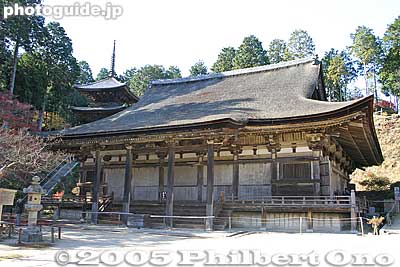
| 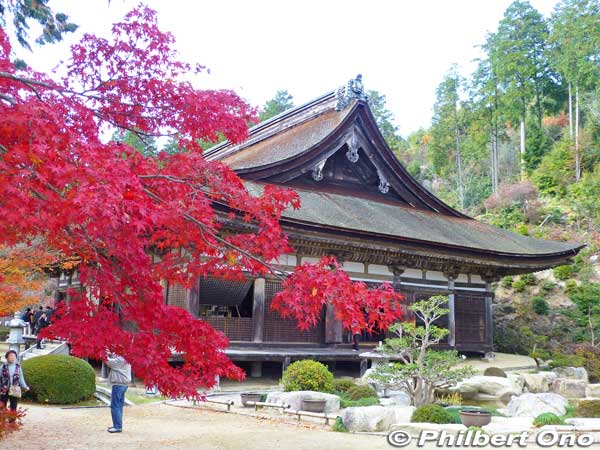
|
| Indigo dying | Zensuiji temple |
More photos at Konan Photos.
Videos
Click on the video image to start playing the video.
CUTE video of "Lake Biwa Rowing Song" sung in English by kids at ECC Junior in Konan city. Taught by our friend. GOOD JOB!!! #琵琶湖周航の歌英語版 pic.twitter.com/IQhv8Uidp3
— Shiga Headlines (@ShigaHeadlines) October 2, 2017
More Shiga videos here.
History
- 2004
- October 1: The towns of Kosei-cho and Ishibe-cho merged to form Konan city.
- Aug. 28, 2022: Heiwado Kosei-Chuo branch (平和堂甲西中央店) shuts down after 36 years in business (since 1986).
Additional Reading
- Zensuiji showing hidden Buddha - April 23, 2015
- Yahei hot chili peppers - February 9, 2015
- Zensuiji temple in autumn - November 28, 2014
Miscellaneous
A pleasant lunch in Konan the other day! Indian Chicken Curry flavored with yahei hot chili peppers at Upper Secret cafe near Kosei Station. Great for coffee or tea too. Akane-san, the friendly manager, once studied in Oklahoma and speaks English. #湖南市 https://t.co/qA6f4fnPSL pic.twitter.com/uvUKtCZOxa
— Shiga Headlines (@ShigaHeadlines) June 16, 2018
Trivia
- Konan has a toilet factory making 2,500 Western-style toilets per day (as of 2021). TOTO's Shiga factory in Konan uses local Mikumo rock to make their toilet bowls. In Japan, sales of Western-style toilets overtook Japanese-style squat toilets since 1977. TOTO also has a kitchen sink factory in neighboring Koka.
- Built in the mid-1970s, Konan City Hall does not meet Japan's updated earthquake resistance standards. It is found to be structurally vulnerable to M6+ earthquakes. As of 2021, the city is still mulling over the construction of a new city hall.
Famous People
Side Trips
Other sights in neighboring cities/towns within easy reach from Konan.
Related Articles
External Links
| Municipalities of Shiga Prefecture 滋賀県 | ||
| Cities & Towns: Aisho-cho | Higashi-Omi | Hikone | Hino-cho | Koka | Konan | Kora-cho | Kusatsu | Maibara | Moriyama | Nagahama | Omi-Hachiman | Otsu | Ritto | Ryuo-cho | Taga-cho | Takashima | Toyosato-cho | Yasu | ||
| 愛荘町 | 東近江市 | 彦根市 | 日野町 | 甲賀市 | 湖南市 | 甲良町 | 草津市 | 米原市 | 守山市 | 長浜市 | 近江八幡市 | 大津市 | 栗東市 | 竜王町 | 多賀町 | 高島市 | 豊郷町 | 野洲市 | ||
| Prefectures of Japan | ||
| Aichi | Akita | Aomori | Chiba | Ehime | Fukui | Fukuoka | Fukushima | Gifu | Gunma | Hiroshima | Hokkaido | Hyogo | Ibaraki | Ishikawa | Iwate | Kagawa | Kagoshima | Kanagawa | Kochi | Kumamoto | Kyoto | Mie | Miyagi | Miyazaki | Nagano | Nagasaki | Nara | Niigata | Oita | Okayama | Okinawa | Osaka | Saga | Saitama | Shiga | Shimane | Shizuoka | Tochigi | Tokushima | Tokyo | Tottori | Toyama | Wakayama | Yamagata | Yamaguchi | Yamanashi | ||